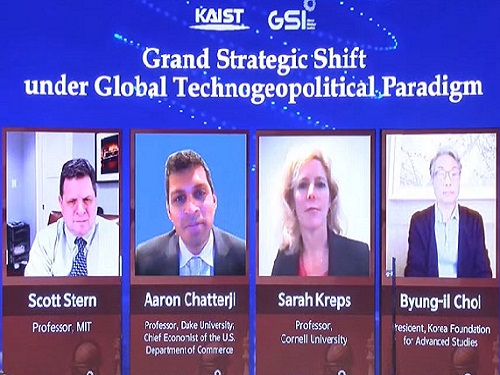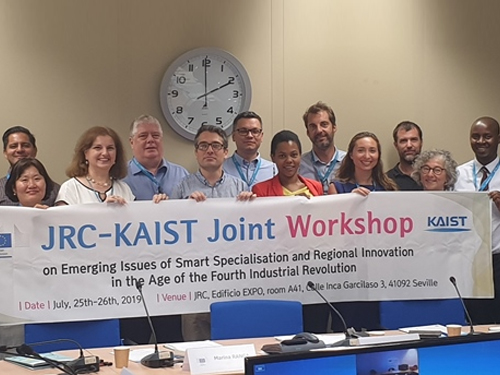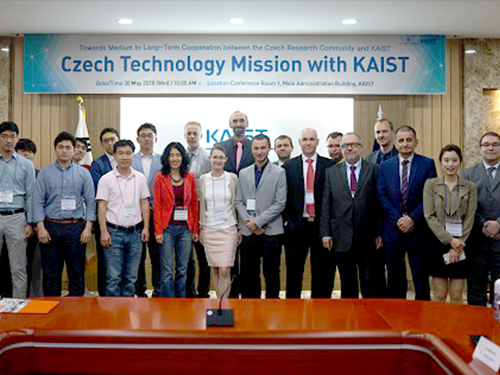So+Young+Kim
-
 GSI Forum Highlights Global Collaboration Toward a Sustainable Global Economy
The forum stresses global collaboration to make the global value chain more resilient
Speakers at the 5th Global Strategy Institute International Forum on October 28 stressed the importance of global collaboration for rebuilding the global economy and making innovations in national science and technology governance in order to enhance national competitiveness. The forum entitled “Grand Strategic Shift under Global Techno-Geopolitical Paradigm” examined strategies for making the global supply chain more resilient and rebuild the global economy as well as how Korea could advance in the technology race.
Speakers concurred that technology has become an issue of national security. The global supply chain has been disrupted amid the global pandemic and intense conflict between the U.S. and China. Speakers presented a common solution: global collaboration and innovations in science and technology governance.
KAIST President Kwang Hyung Lee said in his opening remarks that the future ‘world map’ may turn out very differently depending on how we prepare and what we envision for the future. He also stressed the importance of technology sovereignty, adding that only those who can create their own new technology independently will be the future leaders.
Prime Minister Boo Kyum Kim and Vice Minister of Science and ICT Hongtaek Yong delivered congratulatory remarks. Keynote speakers included Professor Scott Stern from the MIT Sloan School of Management, Professor Aaron Chatterji from the Fuqua School of Business at Duke University, Professor Sarah Kreps from the Department of Government at Cornell University, SK Group Chairperson Tae-Won Chey, President Woo Il Lee of the Korean Federation of Science and Technology Societies, Professor Young Kwan Yoon at Seoul National University, President Eun Mee Kim of Ewha Womans University, and President Ieehwan Kim of the University of Science and Technology.
During the first session, Professor Chatterji stressed that how to make supply chains resilience will be the key for making long-term strategy with relevant government policy. He said that AI has become a general purpose technology (GPT) and Korea ranked 4th in AI innovation in the world, but how to translate this innovativeness into national strategic leadership will be a new challenge for Korea. He suggested that Korea strengthen its strategic partnerships with allies such as the U.S. and provide opportunities not only for established players but start-ups and entrepreneurs. Meanwhile, Professor Kreps said that industrial policy should also leverage trust and innovations for building technology alliances with a more longer-term approach, without antagonizing certain groups of nations.
Vice President for Planning and Budget Bowon Kim who joined the forum as a discussant pointed out that in this hyper-connected era, nothing can be manufactured in a single company and country without the global supply chain. “In longer-term policy and strategies, we should embrace China as a global economy partner and include all nations around the world.”
Chairman Chey from SK said that the clear role among universities, industry, and the government doesn’t exist any longer. Now, universities are working hard for the commercialization of technology from their labs. Industry is nurturing the talents inept for future industry, and the government is trying to introduce a more private-sector approach. As such, universities, the government, and industry should embrace all-inclusive approaches encompassing global politics and trade to lead on the global stage.
Meanwhile in the second session, all of the speakers stressed innovation in science and technology governance in order to adopt to the new industrial paradigm. They agreed to make prompt innovations and solid collaborative systems among the government ministries to ensure national competitiveness, especially in the field of science and technology.
President Lee from KOFST said Korea should adopt a first mover strategy and the government should adopt a mission-oriented projects and deregulate more. He pointed out that when mandating more autonomy in decision making, scientists and students can make more creative outcomes.
Professor Yoon at SNU stressed the close alliance with the U.S. in the technology race, but suggested that Korea should also seek ways to help minimize the technology gap between advanced and developing countries. Universities should also be allowed more autonomy in running creative curriculum and academic affairs to in order boost the competitiveness of science and technology.
President Kim from Ewha pointed out the role of education as a public good. In some countries, strengthening science and technology can be accomplished with wider educational opportunities in middle and high schools. President Kim also stressed expanding strategic partnerships. She said Korea should expand its alliances and partnerships, not only with the U.S. but with European countries and other niche countries where certain technologies are superior.
President Kim of UST stressed a new science and technology leadership is required to build technology sovereignty and the government should spearhead the deregulations of the government policy.
This GSI forum was co-hosted by two think-tanks at KAIST, the Korea Policy Center for the Fourth Industrial Revolution (KPC4IR) and the Innovation Strategy and Policy Institute (ISPI).
2021.10.28 View 9416
GSI Forum Highlights Global Collaboration Toward a Sustainable Global Economy
The forum stresses global collaboration to make the global value chain more resilient
Speakers at the 5th Global Strategy Institute International Forum on October 28 stressed the importance of global collaboration for rebuilding the global economy and making innovations in national science and technology governance in order to enhance national competitiveness. The forum entitled “Grand Strategic Shift under Global Techno-Geopolitical Paradigm” examined strategies for making the global supply chain more resilient and rebuild the global economy as well as how Korea could advance in the technology race.
Speakers concurred that technology has become an issue of national security. The global supply chain has been disrupted amid the global pandemic and intense conflict between the U.S. and China. Speakers presented a common solution: global collaboration and innovations in science and technology governance.
KAIST President Kwang Hyung Lee said in his opening remarks that the future ‘world map’ may turn out very differently depending on how we prepare and what we envision for the future. He also stressed the importance of technology sovereignty, adding that only those who can create their own new technology independently will be the future leaders.
Prime Minister Boo Kyum Kim and Vice Minister of Science and ICT Hongtaek Yong delivered congratulatory remarks. Keynote speakers included Professor Scott Stern from the MIT Sloan School of Management, Professor Aaron Chatterji from the Fuqua School of Business at Duke University, Professor Sarah Kreps from the Department of Government at Cornell University, SK Group Chairperson Tae-Won Chey, President Woo Il Lee of the Korean Federation of Science and Technology Societies, Professor Young Kwan Yoon at Seoul National University, President Eun Mee Kim of Ewha Womans University, and President Ieehwan Kim of the University of Science and Technology.
During the first session, Professor Chatterji stressed that how to make supply chains resilience will be the key for making long-term strategy with relevant government policy. He said that AI has become a general purpose technology (GPT) and Korea ranked 4th in AI innovation in the world, but how to translate this innovativeness into national strategic leadership will be a new challenge for Korea. He suggested that Korea strengthen its strategic partnerships with allies such as the U.S. and provide opportunities not only for established players but start-ups and entrepreneurs. Meanwhile, Professor Kreps said that industrial policy should also leverage trust and innovations for building technology alliances with a more longer-term approach, without antagonizing certain groups of nations.
Vice President for Planning and Budget Bowon Kim who joined the forum as a discussant pointed out that in this hyper-connected era, nothing can be manufactured in a single company and country without the global supply chain. “In longer-term policy and strategies, we should embrace China as a global economy partner and include all nations around the world.”
Chairman Chey from SK said that the clear role among universities, industry, and the government doesn’t exist any longer. Now, universities are working hard for the commercialization of technology from their labs. Industry is nurturing the talents inept for future industry, and the government is trying to introduce a more private-sector approach. As such, universities, the government, and industry should embrace all-inclusive approaches encompassing global politics and trade to lead on the global stage.
Meanwhile in the second session, all of the speakers stressed innovation in science and technology governance in order to adopt to the new industrial paradigm. They agreed to make prompt innovations and solid collaborative systems among the government ministries to ensure national competitiveness, especially in the field of science and technology.
President Lee from KOFST said Korea should adopt a first mover strategy and the government should adopt a mission-oriented projects and deregulate more. He pointed out that when mandating more autonomy in decision making, scientists and students can make more creative outcomes.
Professor Yoon at SNU stressed the close alliance with the U.S. in the technology race, but suggested that Korea should also seek ways to help minimize the technology gap between advanced and developing countries. Universities should also be allowed more autonomy in running creative curriculum and academic affairs to in order boost the competitiveness of science and technology.
President Kim from Ewha pointed out the role of education as a public good. In some countries, strengthening science and technology can be accomplished with wider educational opportunities in middle and high schools. President Kim also stressed expanding strategic partnerships. She said Korea should expand its alliances and partnerships, not only with the U.S. but with European countries and other niche countries where certain technologies are superior.
President Kim of UST stressed a new science and technology leadership is required to build technology sovereignty and the government should spearhead the deregulations of the government policy.
This GSI forum was co-hosted by two think-tanks at KAIST, the Korea Policy Center for the Fourth Industrial Revolution (KPC4IR) and the Innovation Strategy and Policy Institute (ISPI).
2021.10.28 View 9416 -
 FIRIC-EU JRC Joint Workshop on Smart Specialization
The Fourth Industrial Revolution Intelligence Center (FIRIC) at KAIST discussed ‘Smart Specialization’ for regional innovation and economic growth in the wake of the Fourth Industrial Revolution during the workshop with the EU Joint Research Center (EU-JRC) in Seville, Spain last week. The two sides also agreed to sign an MOU to expand mutual collaboration.
KAIST’s FIRIC was founded in cooperation with the World Economic Forum in July 2017 to carry out policy research for the promotion of science and technology-based inclusive growth and innovation and to lead related global efforts. The EU-JRC has committed to developing cohesive policies that aim to narrow regional gaps within the European Union. Founded in 1958 in Brussels, the EU-JRC has long been in charge of EU strategies for regional innovation based on emerging technologies.
The workshop also covered issues related to public-private partnerships and innovation clusters from the perspective of the EU and Asia, such as the global value chain and the implementation of industrial clusters policy amid the changes in the industrial ecosystem due to digitalization, automation, and the utilization of robotics during the Fourth Industrial Revolution.
In addition, the session included discussions on inclusive growth and job market changes in the era of the Fourth Industrial Revolution, addressing how Smart Specialization and the outcomes of the 4IR will shift the paradigm of current job and technology capabilities, as well as employment issues in many relevant industries. In particular, the actual case studies and their related policies and regulatory trends regarding the potential risks and ethical issues of artificial intelligence were introduced.
Regarding the financial services that utilize blockchain technologies and the establishment of public sector governance for such technologies, the participating experts noted difficulties in the diffusion of blockchain-based local currencies or public services, which call for a sophisticated analytical and practical framework for innovative and transparent governance.
Dr. Mark Boden, the Team Leader of the EU-JRC, introduced the EU’s initiatives to promote Smart Specialization, such as its policy process, governance design, vision sharing, and priority setting, with particular emphasis on targeted support for Smart Specialization in lagging regions. Professor So Young Kim, who is the dean of the Graduate School of Science and Technology Policy and FIRIC’s Deputy Director said, “KAIST’s global role regarding the Fourth Industrial Revolution will be expanded in the process of exploring and developing innovative models of technology-policy governance while working jointly with the EU-JRC.”
2019.08.02 View 7922
FIRIC-EU JRC Joint Workshop on Smart Specialization
The Fourth Industrial Revolution Intelligence Center (FIRIC) at KAIST discussed ‘Smart Specialization’ for regional innovation and economic growth in the wake of the Fourth Industrial Revolution during the workshop with the EU Joint Research Center (EU-JRC) in Seville, Spain last week. The two sides also agreed to sign an MOU to expand mutual collaboration.
KAIST’s FIRIC was founded in cooperation with the World Economic Forum in July 2017 to carry out policy research for the promotion of science and technology-based inclusive growth and innovation and to lead related global efforts. The EU-JRC has committed to developing cohesive policies that aim to narrow regional gaps within the European Union. Founded in 1958 in Brussels, the EU-JRC has long been in charge of EU strategies for regional innovation based on emerging technologies.
The workshop also covered issues related to public-private partnerships and innovation clusters from the perspective of the EU and Asia, such as the global value chain and the implementation of industrial clusters policy amid the changes in the industrial ecosystem due to digitalization, automation, and the utilization of robotics during the Fourth Industrial Revolution.
In addition, the session included discussions on inclusive growth and job market changes in the era of the Fourth Industrial Revolution, addressing how Smart Specialization and the outcomes of the 4IR will shift the paradigm of current job and technology capabilities, as well as employment issues in many relevant industries. In particular, the actual case studies and their related policies and regulatory trends regarding the potential risks and ethical issues of artificial intelligence were introduced.
Regarding the financial services that utilize blockchain technologies and the establishment of public sector governance for such technologies, the participating experts noted difficulties in the diffusion of blockchain-based local currencies or public services, which call for a sophisticated analytical and practical framework for innovative and transparent governance.
Dr. Mark Boden, the Team Leader of the EU-JRC, introduced the EU’s initiatives to promote Smart Specialization, such as its policy process, governance design, vision sharing, and priority setting, with particular emphasis on targeted support for Smart Specialization in lagging regions. Professor So Young Kim, who is the dean of the Graduate School of Science and Technology Policy and FIRIC’s Deputy Director said, “KAIST’s global role regarding the Fourth Industrial Revolution will be expanded in the process of exploring and developing innovative models of technology-policy governance while working jointly with the EU-JRC.”
2019.08.02 View 7922 -
 Czech Technology Mission with KAIST
Members of the Czech research community visited KAIST to discuss medium to long-term cooperation with KAIST. This visit was hosted by the Fourth Industrial Revolution Intelligence Center (FIRIC).
The community is comprised of people from Czech enterprises and academic institutes that are leading core technologies for the Fourth Industrial Revolution in the fields of AI, robotics, and biotechnology. They had a chance to meet KAIST professors and visit research labs.
Professor Il-Doo Kim from the Department of Materials Science and Engineering, Professor Seongsu Kim from the Department of Mechanical Engineering, and Professor Hyun Uk Kim from the Department of Chemical and Biomolecular Engineering attended the meeting, which took place in the Mechatronics, Systems, and Control Lab under the Vice President for Planning and Budget Soo Hyun Kim and Professor Kyung Soo Kim from the Department of Mechanical Engineering.
Professor Petr Novák from the Technical University of Ostrava said, “It was a meaningful meeting to help understand research trends on industrial robots in Korea.” Professor So Young Kim from FIRIC said, “The Czech research community is strong in basic research where KAIST has outstanding source technology. I hope this visit will open up a path for medium to long-term cooperation on sharing research and technology know-how between the Czech research community and KAIST.”
2018.06.07 View 7225
Czech Technology Mission with KAIST
Members of the Czech research community visited KAIST to discuss medium to long-term cooperation with KAIST. This visit was hosted by the Fourth Industrial Revolution Intelligence Center (FIRIC).
The community is comprised of people from Czech enterprises and academic institutes that are leading core technologies for the Fourth Industrial Revolution in the fields of AI, robotics, and biotechnology. They had a chance to meet KAIST professors and visit research labs.
Professor Il-Doo Kim from the Department of Materials Science and Engineering, Professor Seongsu Kim from the Department of Mechanical Engineering, and Professor Hyun Uk Kim from the Department of Chemical and Biomolecular Engineering attended the meeting, which took place in the Mechatronics, Systems, and Control Lab under the Vice President for Planning and Budget Soo Hyun Kim and Professor Kyung Soo Kim from the Department of Mechanical Engineering.
Professor Petr Novák from the Technical University of Ostrava said, “It was a meaningful meeting to help understand research trends on industrial robots in Korea.” Professor So Young Kim from FIRIC said, “The Czech research community is strong in basic research where KAIST has outstanding source technology. I hope this visit will open up a path for medium to long-term cooperation on sharing research and technology know-how between the Czech research community and KAIST.”
2018.06.07 View 7225